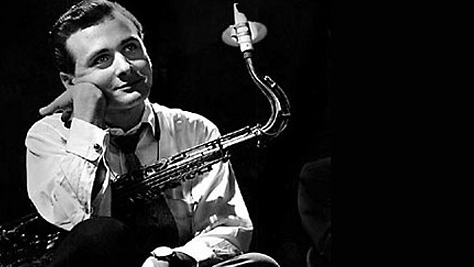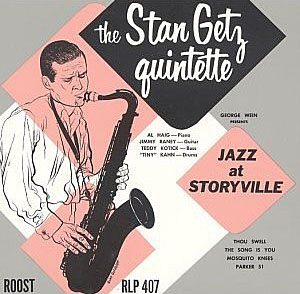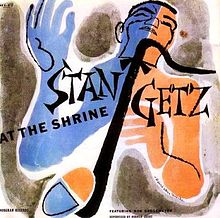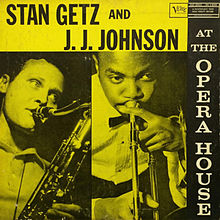|
STAN GETZiTENOR
SAXOPHONEj
 As a feature of Stan Getz, it is the
sound of his tenor saxophone first. Even with the same tenor saxophone,
the sound of Getz is thin, it sounds like a squeaky feeling, compared to
the rugged sound of stretchy, thick, expansive, like Sony Rollins.
Although it is not strong in Rollins, it can be said that it is a soft,
fine and smooth texture of fine texture. Especially since Gotts used heavy
treble frequently, its impression is getting stronger. Instead of trying
to make the blowing breath like the Rollins all sound and making it
bigger, instead of that, the breath not being that sound is doing a
variety of works, that means that they are doing such sounds
. As a feature of Stan Getz, it is the
sound of his tenor saxophone first. Even with the same tenor saxophone,
the sound of Getz is thin, it sounds like a squeaky feeling, compared to
the rugged sound of stretchy, thick, expansive, like Sony Rollins.
Although it is not strong in Rollins, it can be said that it is a soft,
fine and smooth texture of fine texture. Especially since Gotts used heavy
treble frequently, its impression is getting stronger. Instead of trying
to make the blowing breath like the Rollins all sound and making it
bigger, instead of that, the breath not being that sound is doing a
variety of works, that means that they are doing such sounds
.
And I think that his way of playing, that is, his
improvisation is the overwhelming feeling "now and here". This is not a
preliminary nor a retrofit but a miraculous thing that the moment music is
generated by improvisation is presented to the listener as it is, which is
becoming a beautiful piece of music. The instantaneous flashing means that
an easy-to-understand and beautiful melody will spring up naturally, and
if you do it inexperienced, you can not understand what was spun out
improvised by its perfection. Surprisingly, it is too natural that you can
directly hit the thrill and tension that you do not know about the future
as you would witness in Charlie Parker's ad lib. I guess that's why Getz
is called "cool."
That means that the phrase produced by his improvisation
played just by the musical beauty. There is no kind of deception like
relying on the emotional element, sentimental sweet melody or effect of
minor code, or decorating the sound like vibrato or shadow. So it may be
said that cool, but his spinning melody is purely
beautiful.
| STAN GETZ
QUARTETS
 There's
A Small Hotel There's
A Small Hotel
I've
Got You Under My Skin
What's
New
Too
Marvelous For Words
You
Steeped Out Of A Dream
My Old
Flame
My Old
Flame (alternate take)
Long
Island Sound
Indian
Summer
Mar-Cia
Crazy
Chords
The
Lady In Red
The
Lady In Red (alternate take)
Wrap
Your Troubles In Dreams
#8,9,10,11
Stan
Getz (ts)
Al Haig
(p)
Gene
Ramey (b)
Stan
Levey (ds)
1949/06/21
#1,2,3,4
Stan
Getz (ts)
Al Haig
(p)
Tommy
Potter (b)
Roy
Haynes(ds)
1950/01/06
#5,6,7,12,13,14
Stan
Getz (ts)
Tony
Aless (p)
Percy
Heath (b)
Don
Lamond (ds)
1950/04/14
A saxophonist named Stan Getz is a genius who can
unwind without misunderstandings a great phrase improvised with the
imagination of the spot one after another. Although he changed his
style of play during his long period of activity, he has not changed
what is a genius-based talent. And, it is the initial recording that
you can listen to the performances per body with a single match with
only his genius-inspired inspiration. The sound of early recordings
can enjoy the smart, sophisticated and fragile sound. That's his
cool jazz.
Let's listen to the album. The first song "There's A
Small Hotel" to the fourth song "Too Marvelous For Words" was
recorded in January 1950, and it's all a wonderful performance. At
'There's A Small Hotel', the introduction of Al Haig's damp-like
piano is singing anything. And, as encouraged by the piano 's light
tempo, it starts as a floating Geto' s solo floats on a swingy
rhythm. Getz's saxophone uses a versatile tone, and each time its
tone changes its phrase changes. It's a dazzling and dazzling play
as if multiple gets are playing. The third song "What's New" is a
popular ballad. Sachs of Getz stands out transience with a delicate,
soft sound, but it is never Yawah. The phrase that he is doing
improvisation is so perfect as to think that he is playing along the
score, and it seems that it is rather too much.
From the 5th song "You Stepped Out Of A Dream" to the
7th song "My Old Flame (alternate take)", and the 12th song "The
Lady In Red" was recorded with different members in April 1950 .
Since the position of the microphone, the studio and the equipment
are different, we can hear the saxophone of Getz directly in the
vicinity with a dead resonance. This recording is somewhat different
from other soft and pleasing sound quality. The recording of "You
Steeped Out Of A Dream" is said to be a definitive version that was
considered as a masterpiece of Stan Getz. In ad lib from a gentle
theme with a soft faux tone, he is overwhelming with playing out
such a phrase so much as to keep the moist mood of the theme from
being destroyed.
From the eighth "Long Island Sound" to the eleventh
song "Crazy Chords" was recorded in June 1949. In "Long Island
Sound", Getz playing somewhat hot songs with light tempo. In the
next "Indian Summer", he is blowing down in the medium tempo with
ahead. His performance recorded at this time is generally
hot.
Stan Getz was labeled as a genius tenor by white
people, the founder of cool jazz. And this recording has a high
reputation as the record of the height of his early cool jazz. But
if you learned such a reputation and listen to this album with the
ear that you listen to the modern jazz play later, you will probably
feel that it is not hard enough. Because the songs are short and
finished soon, and the sound of Getz in the very heart is a scusca
and a weak impression. Speaking of classical music, it is something
I feel like when I listen to Mozart by listening to a large, long
symphony of the scale of the late Romantic school such as Mahler and
Bruckner. Even in the guide book of jazz etc, and in the recording
of Gets, this album is written as hard to listen to, and it is
recommended as hit album which played bossa nova of later
year. |
|
Stan Getz At
Storyville@@@PXTPNPOQWϊ^Ή
 Thou
Swell Thou
Swell
The
Song Is You
Mosquito Knees
Pennies
From Heaven
Move
Parker
51
Hershey
Bar
Rubberneck
Signal
Everything Happens To Me
Jumping
With Symphony Sid
Yesterdays
Budo
Stan
Getz (ts)
Al
Haig(p)
Jimmy
Raney (g)
Teddy
Kotick (b)
Tiny
Kahn (ds)
Haruki Murakami has praised this stun gets live
recording. "Everything included here is wonderful beyond every
expression, although it is a monthly expression, but here is a
nourishment that is exhausted, for example, listen to" Move ". The
rhythm section of Al Haig, Jimmy Rainie, Teddy Cody and Tiny Khan is
breathtakingly perfect. Simple and cool, and at the same time, they
are unified together with a hot rhythm like lava in the ground. But
far beyond that, the performance of Goetz is brilliant. It freely
goes through the sky like Tenma, pays the clouds, and discloses the
stars full of brightness that is so vivid that it hurts the eyes in
front of us in an instant. The brilliant swell, beyond the years,
hit our hearts violently. Because a song there is a merciless
awakening of the group of starving wolves secretly hidden in that
soul. They exhale the white, silent breath of the beast into the
snow. A white, hard, beautiful breath enough to cut off with a knife
for the hand .... And we quietly see there the destructive cruelty
of living in a deep soul forest.
Please forgive my translation. I do not have such a
feeling as Murakami. However, I am fascinated by Gets' s performance
in this live. Here, Goetz is playing saxophone in a cool, stylish
manner, scrutinizing a beautiful melody. He plays a sweet melody to
run like a midrange to a high region. He plays tenor sax as a
"gentle wind instruments" without being heavy, like a player of a
modern jazz later, stagnating, stagnating, or blowing. Those who
listen to his performance are made to feel warmth, as if there were
no obstacles or the like there. On the other hand, there is a
feeling of being embarrassed somewhere in his warmth. I can say
figuratively about his music as follows. Music that is opposite to
open-minded music, the music of the night - music at the club of
late night, following someone's back, expressing coolness and
melodious at the same time.
In the first "Thou Swell" he changes the sound of
saxophone and plays as if the two players are engaged. If you listen
to this, you will feel casual humor and you will be in a relaxed
atmosphere. "The Song Is You" is a light and fun play with a fast
tempo. As the guitar entangles, the two horns present themes like a
multiplayer. After that, Goetz will develop ad libs quickly. His
improvisation is a relaxed thing out of the power of the shoulder,
and it changes to a new phrase one after another smooth like a soft
velvet flow. It is a masterpiece. His improvisation, like dancing,
singing ... continues. "Mosquito Knees" is also a quick number that
will fold. The performance of Getz here, in terms of the sense of
speed of phrases, the number of sounds that are crispy, will not be
something to take in participating in later battle. Besides, the
song is filled with the fine fast phrase. The fifth song "Move" is a
song that is also acclaimed by Haruki Murakami. The saxophone of
Goetz is running along with the rhythm section. It seems that all of
the phrases that come out as "Pappa Lapar" will sing from that run.
There is nothing like to just show off just the speed and technique
that is fast. That's why it's fun. And in "Parker 51", it seems that
all players will further raise the tempo and boldly advance around
the limit of speed. The pleasure of delivering various ideas in his
performance there is noteworthy. Despite continuing two songs and
playing at the limits of speed, he plays it in a light and cool way
like a joke like hardly feeling the heat and intense like hot blood.
On the other hand, the guitar is also a melody. The rhythm unit also
has an irregular rhythm. Other players like Kori set various musical
dialogues with Getz. He spits out a wonderful ad lib phrase to
respond to them.
The sound of his saxophone at that time was small, it
was tingey, lacking in strength. For example, compared with Sony
Rollins in the second half of the 50's, Getz is soft, but it will
make me want to describe "Hyoro-Hyoro" which makes the sound skip
through. However, although the sound of Sony Rollins is suitable for
a powerful and rugged black hard bop, the sound of Getz is different
from Rollins in its intended direction.
Getz pulls out a phrase that can only be described as
good sense with freely developing the theme using the original
melody of the theme, with a silky tone color with a unique soft
touch of fine texture. Perhaps his stylish phrase is something like
an intuitive flash that springs up naturally. In terms of taking
advantage of such "flash", Gets is in common with Sony Rollins. And
he is awesome when a good "flash" has gotten. He also breaks down
the original melody in the theme part, but it creates a phrase that
makes the best of the former melody properly. And once you go into
ad lib, he creates phrases that are fun to play and unrepentant, one
without hesitation, and one that sings spectacularly. His phrase is
wonderful, of course, lyric phrases in slow ballads. Beyond that,
when he creates a staggered phrase with speed at a rapid tempo, we
can witness the scene where truly lively music comes up
there.
The phrase blown by Getz has never been felt
mechanically. It is a natural phrase born by his flash. He blows
saxophone in a natural tone that seems as if "it sounded like that".
In his performance, these two elements are quite uncomfortable and
blend naturally. In other words, he himself created a phrase that
matched his own sound. In other words, it created a tone that
matches your phrase. Then, once he blows his tenor, even if it is a
theme or an ad lib, there really is a "natural song" overflowing
there. |
|
Stan Getz At The
Shrine@@@PXTSNPPWϊ^Ή
 Flamingo Flamingo
Lover
Man
Pernod
Tasty
Pudding
I'll
Remember April
Polka
Dots And Moonbeams
Open
Country
It
Don't Mean A Thing
We'll
Be Together Again
Feather
Merchant
Stan
Getz(ts),
Bob
Brookmeyer(vtb)
John
Williams(p)
Bill
Anthony(b)
Art
Mardigan(ds)
After the introduction of a brilliant moderator, the
gets start playing the first "Flamingo". Following a short intro by
the piano, Getz and Brookmeier begin playing the theme lightly in an
ensemble. The ensemble of the two wind instruments is an
intertwining interaction. After that, Goetz improvises the phrase
one after another, so that it derives from the theme. It is a series
of spinning threads. Besides, these phrases are melancholic enough
to think why you can do this in a range that is not as wide as
possible in the midrange. The tempo during that period is
maintaining rapid speed. In "Lover Man", Getz and Brookmeier play a
theme in an ensemble at a medium tempo. Goetz makes two ensembles
charming while complementing Brookmeier well. "Pernod" returns to a
light tempo. Getz improvises a beautiful melody based on a light up
tempo than slow ballad. By playing a beautiful melody at high speed,
he avoids the performance falling to centimeters and becoming heavy.
He thinks that it is easier to play beautiful phrases one after the
other with faster tempo than playing with emotional cotton at slow
tempo. I touched another place, but since Getz is an enchanted
person, I think that if the tempo slows down, I can afford a margin
and consider extra things. On the contrary, I think that when he is
fired at a fast tempo, he will have to rely on a flash and his sense
will be sharpened.
To write below is to mention only with the impression
that I personally heard the recording of Gets, so please think that
it is a delusion unrelated to empirical facts such as what kind of
person Stan Getz actually was. Somewhere on this page, I mentioned
that Goetz will flash a beautiful phrase in improvisation. And a
person other than him cannot create a beautiful phrase like a flash
like he does. If you can, you cannot continue to create one after
another, as the phrase always overflows like him. That is why people
struggle to create phrases or suffer from being unable to create.
Ordinarily, the hardships and anguish that a musician does is in
somehow trying to create a phrase that cannot be created easily. He
treats it precisely because it is a phrase created by struggling to
do so. He will use the phrase he creates many times. Some people do
not throw away phrases even if they become obsolete. However, in the
case of Getz, there was no need for such hardships. In his case,
even without a special hardship, I usually come up with a beautiful
phrase. Besides, the phrases I came up with are all beautiful, not
others. He is a genius. That's it. However, if such a group were to
be formed together, what about the surrounding members, I do not
want to do it. Anyway, because you finally got the phrase you
finally got through with difficulties, saying that Getz had thought
of it now, it will easily play more beautiful phrases beyond that.
In addition, what about the audience being heard from it? Can we go
about the continuous attack of beautiful phrases? Every time I am
drunk for that beauty, I am gradually getting full and do not mean
that it is enough anymore. It is not that I get tired. The beauty of
the phrase that Gets creates is not that easy. If you can get bored,
you will not be able to accept it because you are scarred. But Getz
's music is beautiful, so do not get bored and accept it if you
listen. In other words, it does not allow the listener to accept it.
This is a hell to the listener, even if you are full, even if your
belly ruptures, you cannot stop eating. This is an extreme writing
style. I feel that the beauty of the music of Getz has such
dreadfulness and harm. So, I think his performance is the easiest to
listen to the members who are playing together, while breathing,
such as something that gets suddenly lacking a brace in
appropriately flashing. Therefore, I think that it is often a
high-speed number of up tempo, that Getz does not provide much
flashy, often suppressed balanced, easy-to-hear
performances.@ |
|
Stan Getz & J.J. Johnson At The Opera
House@@ PXTVNPOVϊ^Ή
 Billie's
Bounce Billie's
Bounce
My
Funny Valentine
Crazy
Rhythm
It
Never Entered My Mind
Blues
in the Closet
Billie's Bounce
My
Funny Valentine
Crazy
Rhythm
Yesterdays
It
Never Entered My Mind
Blues
in the Closet
Stan
Getz (ts)
J.J.
Johnson (tb)
Oscar
Peterson (p)
Herb
Ellis (g)
Ray
Brown (b)
Connie
Kay (d)
I think that Getz's album which I introduce on this
page will become easier to listen to according to the general
criteria as it goes down. Generally, it is said that Getz has become
a hot trend from the early cool jazz. Getz's performance in this
album is hot, it is also called live. This album was recorded in
1957. Getz this time had a longer performance time than in the early
1950s. Each song has a long performance time nearly doubled. And the
sound of Getz's saxophone is changing from a delicate sound in the
first half of the 50' s to a thick sound, though not strong at this
time. And although the sound quality of his saxophone is as smooth
as it is on the surface, it shows sometimes ruggedness and contrasts
smoothness and emphasizes it. Speaking of baseball, the fastball
pitcher is the same as occasionally throwing a slow change ball and
showing the fastball more quickly than it actually is. For that
reason, I think that this album is easy to listen
to.
In the first "Billie's Bounce", the rhythm section is
full of swing feeling and driving. So, Gets is still playing with a
fluent ad-lib. Besides, in order to ensemble with JJ Johnson, we
limit the materials used in ad libs, and repeatedly use the phrases
that we abandonly abandon if we used before, and are changing
variously. This is normal for other players, but it is unusual for
Getz to do something like that. In the album introduced above, Gets
was not so. But JJ Johnson is a player dealing with phrases
carefully, so get is tailored to him. Therefore, Getz sometimes not
only flows the flow of music just smoothly but also puts a fake, and
intentionally stops the flow and makes a change such as changing. As
he cherished the flow, the impression of the whole performance
changed. His performance here is not a big fake, but sometimes there
is something to get stuck in, so it's sharp in tension and
relaxation even in play. Due to the change in impression arising
from this, it was said that his performance began to change from
cool to hot jazz. "My Funny Valentine" is a famous standard number.
On the medium tempo he plays melodies lightly in accordance with the
groove of the rhythm section that swings. That situation is full of
fun. "Crazy Rhythm" is a play of the noodles as the title. Up to now
I have written the feeling of swing in the rhythm section, but I
feel the atmosphere of dolly music like a dance music before a
period, rather than a hard and rugged urgency Nori of a bop, that
seems to dance happily It is. So even if the title is crazy it is
not madness but nuance like going dancing. Such atmosphere is
perfect for the performance of Getz here. Even in "Blues in the
Closet", getting into a hot game, Getz will show off several times,
from a service spirit to blowing out this way. Moreover, Getz who
has chosen the sound in the narrow range of midrange range will make
it leap.@ |
|




